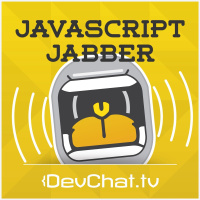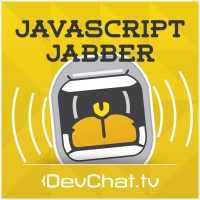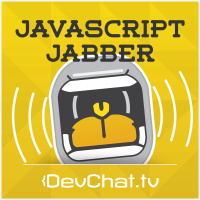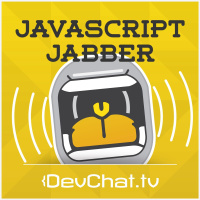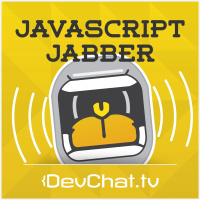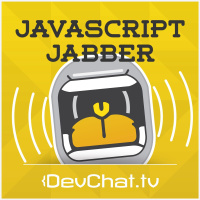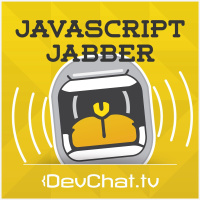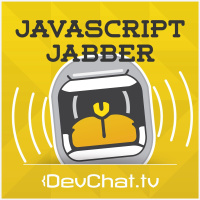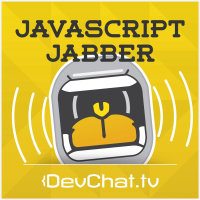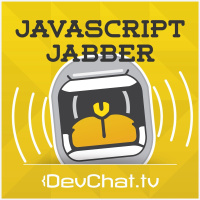Sinopsis
Weekly podcast discussion about Javascript on the front and back ends. Also discuss programming practices, coding environments, and the communities related to the technology.
Episodios
-
Why We’re Building the Front End Wrong (and How to Fix It) - JSJ 688
28/08/2025 Duración: 46minIn this episode of JavaScript Jabber, I sit down with Delaney Gilliland to dive into why most of us are building the front end wrong—and what a faster, leaner, and simpler alternative could look like. We explore his background in game development and military applications, which gave him a unique perspective on web performance and real-time data challenges. That perspective ultimately led him to create Datastar, a new framework designed to rethink the way we approach front-end development.We talk about the limitations of SPAs, the promise (and pitfalls) of tools like HTMX and Turbo, and how Datastar builds on web standards to deliver speed, efficiency, and simplicity without the baggage of heavy state management. Whether you’re curious about server-sent events, morphing strategies, or just want to see how front-end development could be done differently, this conversation will get you thinking about the future of the web.Links & ResourcesDatastar official sitehttps://x.com/DelaneyGillilanhttps://github.com
-
Vibe Coding: Building Faster with AI-Powered Development - JSJ 687
22/08/2025 Duración: 01h11minIn this episode of JavaScript Jabber, we dive deep into the world of vibe coding—what it means, how it works in practice, and why it’s changing the way developers build software. I’m joined by Anthony Campolo, who shares his hands-on experience developing AutoShow, an app that automates podcast show notes, using AI-assisted workflows. We talk about how tools like Claude, ChatGPT, and Gemini accelerate development, the role of rule files, and the balance between automation and manual QA.Along the way, we explore the impact of LLMs on junior vs. senior developers, how companies are adapting AI-driven coding practices, and whether the future of software development still requires humans in the loop. This conversation blends real-world coding insights, practical tools, and some big-picture questions about where AI is taking the industry.Check out Anthony Campolo here.Become a supporter of this podcast: https://www.spreaker.com/podcast/javascript-jabber--6102064/support.
-
The Next Wave of Dev Tools: AI Assistants and JavaScript Workflows - JSJ 686
14/08/2025 Duración: 01h06minIn this episode of JavaScript Jabber, we sit down with Vinicius Dallacqua, a seasoned software engineer with a passion for performance and developer tooling. Vinicius shares his journey from coding in central Brazil with limited connectivity to building cutting-edge tools like PerfLab and PerfAgent. We dive into the intersection of AI and DevTools, exploring how artificial intelligence is transforming performance debugging, web development workflows, and even the future of browsers.We also tackle the big questions: How do developers avoid bias when building in high-performance environments? What role will agentic browsers play in the evolution of the web? And how can AI-powered DevTools lower the barrier for developers intimidated by performance profiling? If you’re curious about the future of frontend performance, DevTools, and AI-driven development, this conversation is packed with insights.Links & ResourcesPerfLab – Performance tooling platformPerfAgent – AI-powered DevTools assistantVinicius Dallacqua
-
Inside VueConf: Nuxt 4, AI in Development, and the Future of Vue with Erik Hanchett - JSJ 685
08/08/2025 Duración: 58minIn this episode of JavaScript Jabber, we welcome back Erik Hanchett, Senior Developer Advocate at AWS, to dive into his experience at VueConf. From the energy of the Vue community to lightning talks on AI and Nuxt updates, Erik shares his insights on where Vue is heading and why in-person conferences are still so valuable for developers. We also explore the balance between “vibe coding” and spec-driven development, plus Erik introduces us to Amazon Q CLI and its powerful MCP integrations for smarter AI-assisted coding.Along the way, we discuss the evolving state of Vue, the rise of Nuxt 4, Evan You’s projects (including Vite and RollDown), and how Amplify is simplifying full-stack app development on AWS. Whether you’re a Vue developer, curious about AI in frontend workflows, or just want to catch up on what’s happening in the broader JavaScript ecosystem, this episode is packed with insights you won’t want to miss.
-
Running Doom in TypeScript’s Type System with Dimitri Mitropoulos - JSJ 684
01/08/2025 Duración: 01h18minWhat if I told you someone managed to run Doom inside TypeScript’s type system? Sounds insane, right? That’s exactly what our guest Dimitri Mitropoulos did—and in this episode, we dive deep into the how, the why, and the mind-bending implications of this ambitious project. From type-level programming to the philosophical limits of Turing completeness, this is an episode that pushes the boundaries of what you thought was possible in JavaScript.We talk about how the TypeScript type system evolved to become Turing-complete, how Dimitri pulled off this seemingly impossible feat, and why “Doom-complete” might just be the new gold standard for computational capability. Along the way, we touch on functional programming, generics, recursion, and even some Lambda Calculus. It’s part computer science theory, part coding madness, and 100% geeky goodness.Episode Highlights[3:05] – Dimitri explains how a simple thought experiment turned into a year-and-a-half-long obsession[8:40] – The origins and significance of Turing c
-
Preact, Performance, and the Future of Lightweight Frontends with Ryan Christian -JSJ 683
23/07/2025 Duración: 01h07minIn this episode of JavaScript Jabber, we sit down with Ryan Christian, a core maintainer of Preact, to talk all things lightweight, performant, and practical in the JavaScript world. If you’ve ever wondered what makes Preact tick, why it continues to gain traction, and how it compares to the heavyweight champ React—this episode is for you.We get into the nitty-gritty of what separates Preact from React, not just in size but in philosophy. Ryan sheds light on how Preact is engineered for performance, why it's not just a “React clone,” and how its compatibility layer makes it easy to drop into existing projects. Plus, we explore signals, class components, and what the upcoming Preact v11 has in store.Episode Highlights[1:23] - Meet Ryan Christian: Preact core maintainer and open-source champion[4:10] - What is Preact, and how does it stack up against React?[10:15] - Preact’s tiny footprint and why size still matters[14:47] - Widgets, adoption, and why Preact powers ~6% of major sites[20:01] - Understanding Prea
-
Speaking Up: The Developer’s Guide to Conference Talks & Career Growth - JSJ 682
10/07/2025 Duración: 01h44minIn this episode of JavaScript Jabber, I am joined by three incredible guests — Ariel Shulman, Liad Yosef, and Eviatar Alush — to dive into the world of public speaking in tech. From the jitters of their first talk to the professional and personal growth that comes with hitting the stage, we unpack the full journey of becoming a tech speaker. Whether you're just curious about getting started or want to sharpen your presentation game, this episode is packed with real talk and insights from experienced voices in the community.We get personal about the why, the how, and the what next of conference speaking — covering the motivations, the process of getting accepted, tips for preparing standout talks, and even how public speaking can open doors to career-changing opportunities. If you've ever wondered what it really takes to be heard on stage, this conversation might just be your launchpad.
-
How Holepunch Is Redefining Peer-to-Peer Apps with Bare.js — A New Era for JavaScript Developers -JSJ 681
24/06/2025 Duración: 01h06minIn this episode, we sit down with Mathias Madsen, CEO of Holepunch, and take a wild ride through the cutting edge of peer-to-peer JavaScript development. Mathias shares his journey from accidentally discovering JavaScript in college to becoming a prolific contributor with over 1,500 open source modules. His passion? Building decentralized, peer-to-peer systems where JavaScript isn’t just for the browser—it powers the entire stack.We dive deep into how Holepunch is reimagining application distribution with their Pear system —essentially turning peer-to-peer into a first-class citizen for distributing full applications, not just files. No hosting, no servers — just apps shared directly, BitTorrent-style. And because packaging and distributing Node-based apps can be painfully complex, they took things a step further by building a new runtime: Bare.jsBare.js is refreshingly "bare": it strips away the heavy, opinionated APIs bundled into Node or Deno, leaving just the JavaScript core and a powerful module system.
-
Migrating a Legacy JavaScript Codebase to TypeScript - JSJ 680
05/06/2025 Duración: 01h25minIn this episode, Dan and I (Steve) dove deep into what turned out to be a surprisingly complex, yet incredibly insightful topic: gradually migrating a massive legacy JavaScript project over to TypeScript. We're talking about nearly 1,000 JS files, 70,000+ lines of code, and years of developer history—all transitioning carefully to a typed, modern future.Dan walked us through how he started by setting up the project for success before converting even one file—getting CI/CD ready, setting up tsconfig.json, sorting out test dependencies, dealing with mock leaks, and even grappling with quirks between VS Code and WebStorm debugging.We talked tools (like TS-ESLint, concurrently, and ts-node), why strict typing actually uncovered real bugs (and made the code better!), and why it’s crucial not to touch any .js files until your TypeScript setup is rock solid.Key Takeaways:Gradual migration is 100% possible—and often better—than ripping the bandaid off.TypeScript can and will catch bugs hiding in your JavaScript. Be p
-
TypeScript, Security, and Type Juggling with Ariel Shulman & Liran Tal - JSJ 679
29/05/2025 Duración: 01h32minIn this episode, we dove headfirst into the swirling waters of TypeScript, its real-world use cases, and where it starts to fall short—especially when it comes to security. Joining us from sunny Tel Aviv (and a slightly cooler Portland), we had the brilliant Ariel Shulman and security advocate Liran Tal bring the heat on everything from type safety to runtime vulnerabilities.We started off with a friendly debate: Has TypeScript really taken over the world? Our verdict? Pretty much. Whether it’s starter projects, enterprise codebases, or AI-generated snippets, TypeScript has become the de facto standard. But as we quickly found out, that doesn’t mean it’s perfect.Key Takeaways:-TypeScript ≠ SecurityWe tend to trust TypeScript a bit too much. It’s a build-time tool, not a runtime enforcer. As Liran pointed out, “TypeScript is not a security tool,” and treating it like one leads to dangerous assumptions.-Type Juggling is Real (and Sneaky)We explored how something as innocent as using as string on request data ca
-
Building Agentic AI Workflows with Matthew Henage - JSJ 678
22/05/2025 Duración: 01h03minIn this episode, we sat down with full-stack developer and AI innovator Matthew Henage, creator of WAOS.ai (Web App Operating System) and the incredible storytelling platform SpeakMagic.ai. This conversation took us deep into the world of agentic AI, low-code app building, and the future of intelligent workflows.We kicked things off with Matthew sharing how he’s been riding the AI wave since GPT-3.5 blew his mind. His platform WoWs is all about making it easy for developers to build powerful web apps with embedded AI workflows — think of it like Zapier meets ChatGPT, but with agents working together instead of API chains.One of the most eye-opening parts of our chat was learning about agent swarms — essentially teams of specialized AI agents that collaborate to perform complex tasks. Instead of relying on one giant AI brain to do everything, you create smaller, purpose-built AIs that handle specific steps in a workflow. It’s scalable, smarter, and kind of like assembling your dream dev team… but all made of c
-
Reinventing Web Development with Brisa: A Conversation with Aral Roca - JSJ 677
15/05/2025 Duración: 01h05minIn this week’s episode, it’s just me — Charles Max Wood — and I’m joined by the incredibly sharp and open-source-loving Aral Roca, direct from Barcelona! Aral’s the creator of Brisa, a new full-stack web framework that flips the script on how we build modern web apps. If you thought the "another day, another framework" meme was played out... well, Brisa might just change your mind.Key Takeaways:-Brisa’s Big Idea: It's designed to let you build web apps with minimal or zero JavaScript on the client side. Think HTML streaming, server actions, and components that render server-side first, but can gradually hydrate on the client.-Server-first FTW: Aral walks us through how Brisa handles server actions — even capturing click and scroll events on the server — using ideas inspired by HTMX, LiveView, and server components from frameworks like Next.js.-Tiny and Mighty: The whole framework is incredibly lightweight. Web components come in at just ~3 KB, and the built-in i18n system is under 1 KB!-From Idea to Reality:
-
Building Enterprise Infrastructure with Bit & AI with Gilad Shoham - JSJ 676
08/05/2025 Duración: 58minIn this episode, I (Steve Edwards) flew solo on the mic but had the pleasure of hosting a truly insightful conversation with Gilad Shoham, VP of Engineering at Bit.Cloud. Gilad brought the heat from Israel as we explored how Bit is revolutionizing enterprise software architecture—and how AI is being layered on top to supercharge developer productivity.We started by breaking down Bit’s core platform, which helps teams compose applications from reusable, independently versioned components. Think Lego blocks, but for your codebase. It’s all about boosting dev velocity, reducing duplication, and making collaboration across teams more seamless.Gilad walked us through some jaw-dropping features: versioning without Git, deep component CI pipelines, and even Bit’s ability to replace monolithic repositories with a graph of decoupled components. Everything is Node + TypeScript under the hood, and while it’s currently JS-focused, the ambition is clearly broader.Then came the big twist: AI. Bit is now leveraging AI not t
-
Replacing Create React App: Why Create TS Router App Is the Future of React Development - JSJ 675
02/05/2025 Duración: 01h30minWe’ve been diving into the evolving landscape of React app development and why tools like Create TS Router App (CTA) are stepping up to fill the gap left by the deprecation of Create React App (CRA). What we’ve learned is that SSR (server-side rendering) isn’t one-size-fits-all—e-commerce sites need it for SEO and performance, but internal tools and dashboards often don’t. That’s where CTA shines. It gives us a fast, modern, Vite-powered setup with TanStack Router built in, so we can start small and scale up without committing to heavy frameworks like Next.js from day one.What we love about CTA is how it keeps things familiar (same structure as CRA) while giving us type safety, file-based routing, and the flexibility to add only the features we need—like Clerk, Sentry, or even SolidJS support. Whether we’re building a simple prototype or a full-featured app, CTA makes the experience smoother, more intuitive, and future-friendly.Become a supporter of this podcast: https://www.spreaker.com/podcast/javascript-ja
-
Mars, Potions, and Streamlining Tech: A Conversation About Creativity and Innovation - JsJ 674
21/04/2025 Duración: 01h22minIn this episode, we dive into a mix of recommendations and a behind-the-scenes look at our podcasting journey. First, we share our love for Revolutions, the podcast by Mike Duncan, where he takes listeners through major historical revolutions, from the English and French Revolutions to the Russian Revolution and beyond. It's a fascinating, deep dive into history that we highly recommend.Become a supporter of this podcast: https://www.spreaker.com/podcast/javascript-jabber--6102064/support.
-
Building 50 Apps in 50 Days: The Power of Boring Stacks with Kelvin - JsJ_673
14/04/2025 Duración: 01h49sIn this episode, we dive into an engaging conversation with Kelvin, where we explore his approach to full-stack JavaScript development and the power of using simple, stable technologies to speed up app development.Kelvin shares his exciting project, "Project 50," where he’s challenging himself to build 50 apps in 50 days, highlighting the importance of leveraging "boring" stacks to streamline the development process. We also touch on his journey in teaching web development through free resources and screencasts, aiming to make it easier for developers to build real-world apps quickly. Along the way, we discuss the value of strategy games like chess and Go, and how they help foster critical thinking and continuous learning. It’s a great mix of tech, strategy, and entertainment, making this episode a must-listen for developers and anyone looking to level up their skills. Tune in for a fun and insightful discussion!Become a supporter of this podcast: https://www.spreaker.com/podcast/javascript-jabber--6102064/su
-
Breaking Into Tech: Lessons from My Career Path - JsJ 672
07/04/2025 Duración: 44minThis episode is a little different—thanks to a U.S. holiday, I’m flying solo. But that just means we get to have a one-on-one chat!I dive into my career journey—not to brag, but to offer insights for anyone feeling stuck, of how my inventor grandfather sparked my early interest in tech, how I transitioned from electrical engineering to computer engineering, and how I went from IT support to discovering my love for programming while solving real-world problems at Mosey with Ruby on Rails.Become a supporter of this podcast: https://www.spreaker.com/podcast/javascript-jabber--6102064/support.
-
Pioneers of Computing: A Journey Through Tech History with Bob Martin - JsJ 671
01/04/2025 Duración: 01h09minIn this episode, we dive into a fascinating mix of tech history, personal stories, and entertainment recommendations. We chat with Bob Martin, who shares insights from his new book, offering a look back at the pioneers of computing, including early breakthroughs and the industry's evolution. Bob talks about the challenges of leaving out influential figures like Margaret Hamilton, Donald Knuth, and Linus Torvalds, while also reminiscing about his early career as a self-taught developer during the 70s.The conversation takes a fun turn when we discuss some mind-blowing tech feats, including a wild project where Doom was implemented using TypeScript’s type system—a true demonstration of the power of programming languages. For those into entertainment, we share some great picks, like the classic science fiction novels When Worlds Collide and After Worlds Collide, plus a rundown of TV shows like Reacher and the intriguing comparison between the Expanse books and TV show. Packed with history, tech talk, and plenty o
-
Beyond Aesthetics: What the Next Generation of Frameworks Should Offer - JsJ_670
06/03/2025 Duración: 01h15minIn this episode of JavaScript Jabber, our host Charles Max Wood, panelist Dan Shappir, and special guest Yoav Abrahami, CTO of Wix Enterprise, engage in a fascinating discussion on the evolving landscape of web frameworks. They dive into the functional and nonfunctional requirements of frameworks, the emerging innovations in meta frameworks, and the significant market shifts driven by increasing regulations and AI advancements. Yoav shares insights into his work on creating a collaborative web framework aimed at bridging the gap between designers and developers, while also addressing crucial future trends in security and design-to-code capabilities. Tune in to explore the dynamic future of web development with insights from industry leaders.Become a supporter of this podcast: https://www.spreaker.com/podcast/javascript-jabber--6102064/support.
-
A Guide to AI Models: From Tokenization to Neural Networks with Ishaan Anand - JsJ_669
21/02/2025 Duración: 01h38minIn this enlightening episode of JavaScript Jabber, hosted by Charles Max Wood and Steve Edwards, panelist AJ O'Neil is joined by guest Ishaan Anand to delve deep into the intricacies of AI and large language models. Ishaan, an expert with over two decades of experience in engineering and product management, shares insights into his innovative implementation of GPT-2, providing a comprehensive breakdown of how transformers work in AI. The discussion covers various aspects of AI, including how models predict the next word, the concept of tokenization, embeddings, and the attention mechanism which is central to transformer architectures. Listen in as they explore practical applications, challenges, and the evolving landscape of AI, with a special emphasis on mentorship and education through Ishaan's unique course offering. Whether you're an AI aficionado or a JavaScript developer eager to expand your knowledge, this episode offers valuable perspectives and learning opportunities.Become a supporter of this podcas

